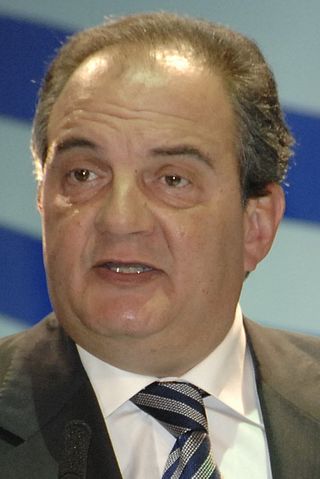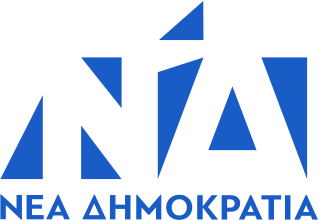The National Rally, until 2018 known as the National Front, is a far-right political party in France. It is the largest parliamentary opposition group in the National Assembly and the party has seen its candidate reach the second round in the 2002, 2017 and 2022 presidential elections. It is an anti-immigration party, advocating significant cuts to legal immigration and protection of French identity, as well as stricter control of illegal immigration. It also advocates for a 'more balanced' and 'independent' French foreign policy by opposing French military intervention in Africa and by distancing France from the American sphere of influence by leaving NATO's integrated command. It supports reform of the European Union (EU) and its related organisations. It also supports economic interventionism and protectionism, and zero tolerance of breaches of law and order. The party has been accused of promoting xenophobia and antisemitism.

The Democratic Social Movement is a social-democratic political party in Greece. The party was founded in 1995 by Dimitris Tsovolas and several ex-members of the Panhellenic Socialist Movement (PASOK), the then ruling social-democratic party.

Konstantinos A. Karamanlis, commonly known as Kostas Karamanlis, is a Greek retired politician who served as the 10th Prime Minister of Greece from 2004 to 2009. He was also president of the centre-right New Democracy party, founded by his uncle Konstantinos Karamanlis, from 1997 to 2009, and as member of the Hellenic Parliament from 1989 to 2023.

New Democracy is a liberal-conservative political party in Greece. In contemporary Greek politics, New Democracy has been the main centre-right political party and one of the two major parties along with its historic rival, the Panhellenic Socialist Movement (PASOK). New Democracy and PASOK were created in the wake of the toppling of the military junta in 1974, and ruled Greece alternately for the next four decades. Following the electoral decline of PASOK, New Democracy remained one of the two major parties in Greece, the other being the Coalition of the Radical Left (SYRIZA). The party was founded in 1974 by Konstantinos Karamanlis and in the same year it formed the first cabinet of the Third Hellenic Republic. New Democracy is a member of the European People's Party, the largest European political party since 1999, the Centrist Democrat International, and the International Democrat Union.

The Popular Orthodox Rally or People's Orthodox Alarm, often abbreviated to LAOS (ΛΑ.Ο.Σ.) as a reference to the Greek word for people, is a Greek right-wing populist political party. It was founded by journalist Georgios Karatzaferis in 2000, a few months after he was expelled from the centre-right New Democracy. Today, the party is led by Nikolaos Salavrakos.
At a national level, Greece holds elections for its legislature, the Hellenic Parliament.

The Popular Association – Golden Dawn, usually shortened to Golden Dawn, is a far-right neo-Nazi ultranationalist criminal organization and former political party in Greece. Golden Dawn rose to prominence during Greece's financial crisis of 2009, becoming the third most popular party in the Greek parliament in the January 2015 election. Its support since plunged, and it failed to enter parliament in the 2019 election. The criminal trial against the leaders, frequently described as the largest Nazi trial since the Nuremberg trials, lasted more than five years.

National Democracy is a far-right political party in Spain, founded in 1995. It is modelled on the National Rally (RN) of France, and grew indirectly out of several defunct parties like the Spanish Circle of Friends of Europe (CEDADE) group and Juntas Españolas. Until 2018, its leader was Manuel Canduela Serrano, a former member of Acción Radical, a group active in the Valencian Community. He was also a vocalist in the so-called "identity" rock group Division 250. The party's current leader is Pedro Chaparro.

Ecologist of Greece is a Greek political party based in Athens that was founded in 1988. It was led by Konstantinos Papanikolas.

Kyriakos Velopoulos is a Greek politician. He is a member of the Hellenic Parliament and has been president of the Greek Solution political party since its foundation in 2016. Velopoulos is a former parliamentarian for the Popular Orthodox Rally (LAOS) and former member of New Democracy. He is also a journalist, author and television personality.

Mavroudis (Makis) Voridis is a Greek politician and lawyer. His previous and current involvement with far-right rhetoric and past association with dictator Georgios Papadopoulos has made him a controversial figure in Greek politics.

Patriotic Alliance was a short-lived Greek ultranationalist political party, founded in 2004. It was a member party of the European National Front.
Spyridon-Adonis Georgiadis, better known as Adonis Georgiadis, is a Greek far-right politician, telemarketer and publisher. Currently serving as the Minister for Development and Investment in the Cabinet of Kyriakos Mitsotakis, he is the vice-president of New Democracy. He previously served as Deputy Minister for Development, Competitiveness and Shipping in the Cabinet of Lucas Papademos (2011–2012) and Minister for Health in the Cabinet of Antonis Samaras (2013–2014).

The Independent Greeks – National Patriotic Alliance is a national-conservative political party in Greece.
European Parliament elections were held in Greece on 25 May 2014 to elect the 21 Greek members of the European Parliament. The number of seats allocated to Greece declined from 22 to 21, as a result of the 2013 reapportionment of seats in the European Parliament.

Attica , formerly Remainder of Attica, was an electoral district in the Attica region represented in the Hellenic Parliament. It consisted of East Attica and West Attica and covered all of Attica except for the urban area of Athens, which were covered by the constituencies of Athens A, Athens B, Piraeus A and Piraeus B. It elected fifteen Members of Parliament (MPs). It was abolished in December 2018 and replaced by East Attica and West Attica.

Legislative elections were held in Greece on 7 July 2019. The elections were called by Prime Minister Alexis Tsipras on 26 May 2019 after the ruling Syriza party lost the European and local elections. They were the first national elections since the voting age was lowered to 17, and the number of parliamentary constituencies was increased from 56 to 59. Athens B, the largest constituency before the 2018 reforms, with 44 seats, was broken up into smaller constituencies, the largest of which had 18 seats.
Apportionment in the Hellenic Parliament refers to those provisions of the Greek electoral law relating to the distribution of Greece's 300 parliamentary seats to the parliamentary constituencies, as well as to the method of seat allocation in Greek legislative elections for the various political parties. The electoral law was codified for the first time through a 2012 Presidential Decree. Articles 1, 2, and 3 deal with how the parliamentary seats are allocated to the various constituencies, while articles 99 and 100 legislate the method of parliamentary apportionment for political parties in an election. In both cases, Greece uses the largest remainder method.













